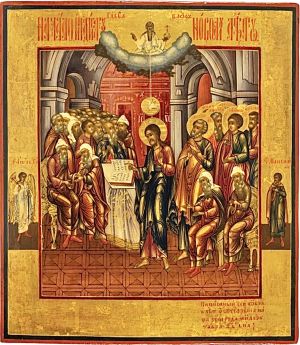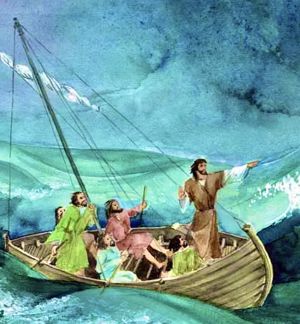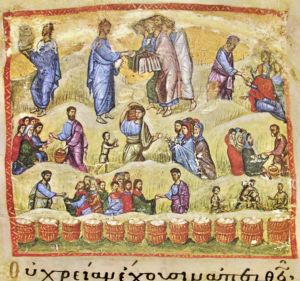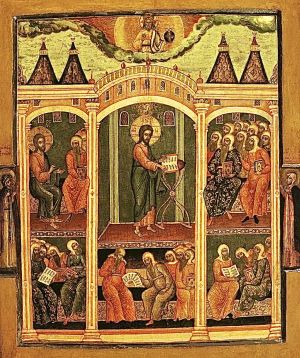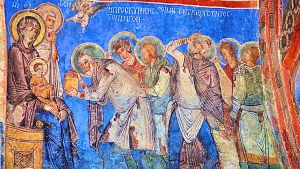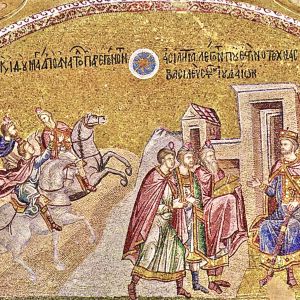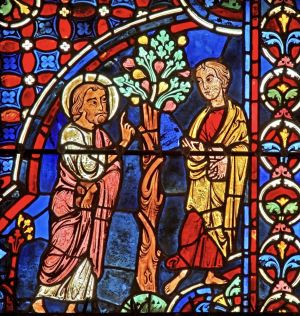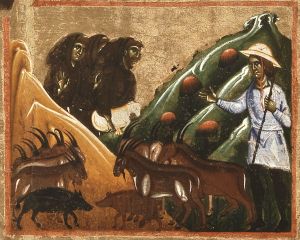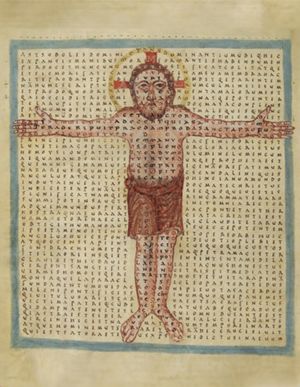
Teresa Girolami
Teresa Girolami è laureata in Materie letterarie e Teologia. Ha pubblicato vari testi, fra cui: "Pellegrinaggio del cuore" (Ed. Piemme); "I Fiammiferi di Maria - La Madre di Dio in prosa e poesia"; "Tenerezza Scalza - Natura di donna"; co-autrice di "Dialogo e Solstizio".
«The Spirit of the Lord upon me, therefore, has anointed me to proclaim the Good News to the poor»
Francis had been mocked and treated like a madman in his native Assisi, looked down upon as an unclean cloth by the 'good people' of the place, sunk in feudal solace and entertainment.
After his conversion, invested by the power of the Spirit, he had understood that his mission was to proclaim the joyful message of the Father to the poor, proclaiming the year of grace of the Lord with the concrete witness of his life.
This had placed him on the track of the poverty of the Son of God, making himself one with it wherever he saw it.
The Sources, teachers of lived life, inform us:
"He stooped, with marvellous tenderness and compassion, towards anyone afflicted by some physical suffering, and when he noticed in someone indigence or need, in the sweet pity of his heart, he regarded it as a suffering of Christ himself.
He had an innate feeling of clemency, which the pity of Christ, infused from above, multiplied.
He felt his heart melt in the presence of the poor and the sick, and when he could not offer help, he offered his affection.
One day, a friar responded rather harshly to a poor man, who asked for alms in an importunate manner.
Hearing this, the pitiful lover of the poor commanded the friar to prostrate himself naked at the poor man's feet, to plead guilty, and to ask him in charity to pray for him and forgive him.
The friar did so, and the Father commented sweetly:
"Brother, when you see a poor person, the mirror of the Lord and his poor Mother is placed before you. Likewise in the sick, know how to see the infirmities with which Jesus clothed Himself".
In all the poor, he, himself poor and very Christian, saw the image of Christ. Therefore when he met them, he generously gave them everything they had given him, even the necessities of life; indeed, he was convinced that he had to give it back to them, as if it were their property" (FF 1142).
The voice of the Lord had been heard in his heart for some time, inviting him to fulfil a specific and new mission, by the Spirit.
After a vision given to him from on high, a divine Voice had spoken to him and Francis had responded:
"Lord, what do you want me to do?".
"Return to your land," replied the Lord, "because the vision, which you have had, represents a spiritual mission, which must be fulfilled in you, not by human disposition, but by divine disposition" (FF 1032).
Francis could indeed repeat loudly:
«The Spirit of the Lord is upon me, therefore he has anointed me to proclaim the Good News to the poor» (Lk 4:18).
Wherever he found himself, in church or in the open air, before the poor or the haughty, he never feared to incarnate the prophecy-mission that had touched and chosen him.
To the dispossessed of his time as to those of every age he proclaimed the Good News of the Kingdom with tenacious relevance.
Proper Feria, January 10
With Jesus the little boat reaches the shore
The Mk passage highlights the fear of the disciples who on the rough sea see the Lord coming.
But He reassures them: «Courage, I Am, do not be afraid!».
Francis, the Herald of the Gospel, a few years after his conversion, guided by the Spirit who on every occasion pushes the sail of human existence, wished to die for Christ in the proclamation of the Word - overseas.
His encounter with Jesus had made him courageous and tenacious, so much so that he exhorted his own brothers to abandon all fear in sailing through the storms of the world.
It is interesting to stop and meditate on a passage from the Sources that portrays Francis in the experience of headwinds.
"Six years after his conversion, inflamed by the desire for martyrdom, he decided to cross the sea and go to the parts of Syria, to preach the Christian faith and penance to the Saracens [...] But the ship on which he had embarked, in order to reach that country, was forced by contrary winds to disembark in the parts of Schiavonia. He stayed there for some time; but then, not being able to find a ship to go to the overseas countries, defrauded in his desire, he begged some sailors, bound for Ancona, to take him with them, for the love of God. He was flatly refused, because he did not have the necessary money.
Then the man of God, putting all his trust in the goodness of the Lord, secretly boarded the ship anyway, with his companion. A fellow came along - certainly sent by God to help his poor fellow - bringing with him the necessary food. He called one of the sailors, who had the fear of God, and spoke to him as follows: "Keep all this stuff for the poor brothers who are hiding on the ship: you will give it to them when they need it".
Except that, it happened that, because of the violence, the sailors could not disembark for many days and so consumed all the provisions. All that was left was the food offered in alms, from above, to poor Francis. It was very scarce, in truth; but the divine power multiplied it in such a way that it was enough to fully satisfy the needs of all, for all those stormy days, until they could reach the port of Ancona.
The sailors, seeing that they had escaped death many times through the merits of the servant of God, gave thanks to Almighty God, who always shows himself admirable and loving in his friends and servants. With good reason, for they had experienced at first hand the dreadful dangers of the sea and had seen the admirable works of God in the deep waters" (FF 1170).
We read again of the Poverello:
"Having left the sea, he began to wander the earth, sowing there the seed of salvation and reaping an abundant harvest of good fruits" (FF 1171).
"Comforting himself in the Lord, he prayed confidently and repeated singing that word of the prophet: for even if I should walk in the midst of the shadow of death, I will fear no evil, for you are with me" (FF 1172).
His faith in Christ made him overcome all fears, even in unfortunate situations, knowing in Whom he had placed all hope.
Proper Feria of January 9
To recognise Christ
At the mere thought of the Lord's Supper, beyond rhetoric.
Like Chiara, the Poor Man of Assisi always had a special concern and veneration for the Eucharist.
The mere thought of the Lord's Supper, of how and how much Jesus had done for every soul, made him tremble in body and spirit. He considered it essential, in order to live the Gospel fully, that he and his friars give themselves to their neighbours in every way and in every circumstance.
Francis understood perfectly that everything is rhetoric if there is no effective gift of self to one's brothers and sisters, who need concrete witness in order to recognise Christ.
The Sources, the Franciscan treasure chest, attest to this truth that he lived:
"Therefore, I implore all of you, brethren, kissing your feet and with all the love I am capable of, that you give, as much as you can [...] all reverence and honour to the Most Holy Body and Blood of our Lord Jesus Christ, in whom all things in heaven and on earth have been pacified and reconciled to Almighty God" (FF 217).
And again: "We know that there can be no body unless it is first sanctified by the Word. For we possess and see nothing bodily in this world of the Most High except the body and blood, the names and words by which we have been created and redeemed 'from death to life'" (Letter of Francis to all clerics; FF 207).
"He burned with love in every fibre of his being for the sacrament of the Lord's Body, overcome with wonder beyond measure at such benevolent condescension and most generous charity [...] He offered the sacrifice of all his limbs, and when he received the immolated Lamb, he immolated his spirit in that fire, which always burned on the altar of his heart" (FF 789).
Having thus penetrated the Mystery by grace, Francis became the living Eucharist, the effective gift of the One who dwelt within him.
Proper Feria, January 8
Witnesses of the near Kingdom
In today's Gospel, Jesus preaches conversion and announces the nearness of the Kingdom, as he travels throughout Galilee healing all kinds of illnesses and infirmities, bringing his Light.
For Francis, St Mary of the Angels was his dearest place, for it was here that he came to know the humility of his origins.
About it a friar, very devoted to God, before his conversion had this vision.
"It seemed to him that he saw innumerable men, stricken with blindness, standing around this church, on their knees and with their faces turned towards heaven.
They all stretched out their hands upwards and, weeping, they cried out to God for mercy and light.
And behold, there came from heaven an immense splendour, which, penetrating into them all, brought to each one the desired light and salvation" (FF 1049).
«Repent, for the kingdom of heaven is at hand» (Mt 4:17)
Francis attained Grace and changed his life "began to reproach himself for his own pusillanimity and cowardice and, having left his hiding place and cast off fear, set out on the journey to Assisi.
His fellow citizens, seeing him squalid in face and changed in mind, believing him to be out of his mind, threw mud and stones from the streets at him, and, shouting and clamouring, insulted him as a madman, a demented person" (FF 1041).
But those who encountered Christ in earnest always considered all this 'rubbish'.
Clare too had made room for the kingdom of heaven close by, living it from her youth.
In fact we read from the Acts of the canonisation process:
"About the conversion of St Clare in her father's house.
1. Sister Pacifica de Guelfuccio de Assisi, a nun of the monastery of Saint Damiano, swore: that she knew Saint Clare while she was in her father's house; and that by all those who knew her, she was held to be of great honesty and a very good life; and that she was intent and occupied about the works of piety.
Of her conversion.
2. And he said that St Clare by the admonition of St Francis began the Order which is now in St Damiano [...].
3. And said that the Lady Clare loved the poor very much; and because of her good conversion all the citizens held her in great veneration [...].
Proper feria of January 7 (Mt 4:12-17.23-25)
Epiphany of Francis and Clare: Star Poverty
Star-Poverty. Gold Incense Myrrh
The Epiphany of the Lord offers evangelical expressions of extraordinary beauty. On the lips of the Magi we find a phrase that belongs to us, as worshippers of the Child of Bethlehem: "We saw his star appear and we came to adore him" (Mt 2:2).
In Francis of Assisi the breadth, the height and the depth of the Mystery of the Manifestation of the Son of God has singular connotations not to be overlooked.
We need only think of some passages from the Sources that record the extent of this.
"The Saint willingly stayed in the hermitage of Greccio, both because he saw it as rich in poverty and because from a secluded cell, built on the prominent rock, he could devote himself more freely to the contemplation of heavenly things.
It was precisely this place, where some time before he had celebrated the Christmas of the Child of Bethlehem, making himself a child with the Child" (FF 621).
Again: 'He could not think back without weeping how much penury the poor Virgin had found herself in [...].
Once, while he was sitting at lunch, a friar reminded him of the poverty of the Blessed Virgin and the destitution of Christ her Son. Immediately he got up from the table, burst into sobs of sorrow [...].
That is why he called poverty a royal virtue, because it shone with such splendour in the King and Queen" (FF 788).
The Star that guides Francis to the grotto to adore the Son of God is Poverty. This shines in the penury of Bethlehem and moves him to tears.
To the Child-God the Little One of Assisi offered the gold of his love for the poor, the fire of his continual contemplation of the Mystery and the myrrh of the many sufferings received in custody from the Gift of the Father, unrolled for us on earth.
His closeness to the people was such that he wore a very poor cassock, which resembled the rough tunic of the poor.
All his friar sons were also close to the people, and all this made him a Worshipper par excellence of the bare Deity, only clothed in flesh; a figure close to the needs of man.
"One day a poor man asked him for alms, and he, having nothing to hand, unbuttoned a flap of his cassock and gave it to the poor man.
Other times, for the same purpose, he even took off his trousers.
Such was the tender compassion he felt for the poor and such was the affection that drove him to follow in the footsteps of the poor Christ" (FF 677).
And of this making a gift of himself to the King in the poor he tried, with great care, to inform his brothers.
One episode attests to this:
"He was certainly good-hearted by nature, but he became doubly so through the charity that was given to him from on high [...] Whatever the need and whatever need he saw in others [...] he referred them to Christ.
Thus in all the poor he recognised the Son of the poor Madonna and bore naked in his heart the One whom she had carried naked in her arms' (FF 670).
She worshipped in her heart the Child who had become a Gift for humanity, and she sought His likeness in those who most closely displayed His features. So much so that once, meeting a poor man and observing his extreme nakedness, she said to the friar who accompanied her:
"I have chosen poverty for my wealth and my woman: but here it shines most brightly in this one.
Knowest thou not that it is known throughout the world that we are the poor for Christ's sake?
But this poor man convinces us that this is not so" (FF 671).
Following the star of the holy evangelical poverty of which Francis was in love, he came to the grotto of the Manifestation, where all are called to adore the Son of God.
He tasted Beauty made flesh by another road, far from the not so few 'Herods' sons of deception.
"The man of God stood before the manger, filled with pity, sprinkled with tears, overflowing with joy" (FF 1186).
«We saw his star rising and came to worship him» ( Mt 2:2)
Epiphany of the Lord (Mt 2:1-12)
Changing lives, becoming Heralds. Nathanael and Francis
Jesus addresses Nathanael, a pious Israelite in whom there is no falsehood and committed to the profession of faith, who will see greater things than those already contemplated.
In the light of the Gospel episode, comparing the Franciscan Sources, we discover interesting passages.
Captivated by the newness of the Spirit, Francis changes his life and becomes a sign of contradiction for a world that had no desire to depart from the commonplace, from the path of traditions.
His free heart faces every contempt, in order to be loyal to Christ and his Gospel.
"Francis, the illiterate, the friend of simplicity, with an incomparably sincere and noble heart [...] how much this name of Francis befits him, to him who had a frank and noble heart more than any other" (FF 529).
Embracing his new state of life, one day, to the brigands who attacked him asking who he was, in sincerity, he replied:
«I am the herald of the great King; does that interest you?» (FF 346).
He can be considered 'an Israelite' in whom no falsehood dwells!
«You will see greater things than these!» (Jn 1:50)
Proper Feria of January 5 (Jn 1:43-51)
«For from his fullness we all received, and grace upon grace»
Francis was rapt in ecstasy as he meditated on the Beauty of a God who asks to be received in order to pour out his Love. The faith that animated him opened up new horizons and new proposals.
He was attracted by this 'humanised' God, who became Small so that man could live as a new creature.
Hence his search for contemplation, hidden spaces devoted to the wonder of the Mystery.
The Sources attest to the Grace in him:
"The Father used not to neglect any visitation of the Spirit: when it presented itself to him, he welcomed it and enjoyed the sweetness that was given to him, as long as the Lord allowed it.
Thus, if he gradually felt a few touches of the Grace while he was cramped with commitments or on a journey, he tasted that sweet manna on several and frequent occasions.
Even on the way he would stop, letting his companions go on, to enjoy the new visitation of the Spirit and not receive grace in vain" (FF 682).
(FF 682) "He tried with all care to hide the gifts of the Lord in the secret of his heart, because he did not want that, if they were an occasion of human glory, they should also be a cause of ruin for him [...] Turning then to himself he would say:
"If the Most High had granted such great graces to a thief, he would be more grateful than you, Francis!
For, as the Poor Man of Assisi wrote in his paraphrase to the Our Father:
"You reign in us through Grace and make us come into your kingdom, where the vision of you is without veils, the love of you is perfect, the communion of you is blissful, the enjoyment of you without end" (FF 269).
2nd Sunday after Christmas, (Jn 1:29-34) in part v.16
The Lamb and the lambs
«Behold the Lamb of God, the one who takes away the sin of the world».
Francis, the Minim, loved all animals, but he had a particular fondness for the lamb, because it reminded him of the Lamb of God sacrificed for our Redemption.
The mere thought of the Son of God sent to the slaughter moved him deeply, even to tears.
The Sources, an inexhaustible treasure chest of early life, offer us very significant pictures in this regard.
"He had a special tenderness for lambs, because in Scripture Jesus Christ is often and rightly compared to the meek lamb because of his humility.
For the same reason, his love and sympathy turned in a special way to all those things that could best depict or reflect the image of the Son of God" (FF 455).
"Another day, on a pilgrimage through the same March, with the same Brother Paul, who was very happy to accompany him, they came across a man who was bringing to market two lambs to sell, tied, bleating and dangling from his shoulders.
On hearing those bleats, the servant of God, greatly moved, approached them, stroking them, as a mother does with her crying children, with much compassion, and said to the master:
"Why do you torment my brother lambs, keeping them so tied and dangling?"
He answered: "I am taking them to the market and selling them: I need money". And Francis: "What will become of them?" And they: "The buyers will kill them and eat them".
On hearing this the Saint exclaimed: "Never let it be! Take my cloak as recompense and give me the lambs".
The man was well pleased with such a barter, for the cloak, which Francis had received on loan from a man that very day to shelter him from the cold, was worth much more than the two beasts.
But having received the lambs, the saint again realised the awkward problem: "How to provide for them?" and, on the advice of Brother Paul, he returned them to their master, advising him not to sell them, not to harm them in any way, but to keep and guard them with care" (FF 457).
Proper Feria of January 3 (Jn 1:29-34)
Voice of the Logos!
The Gospel passage presents the testimony of John, the Forerunner.
To those who ask him who he was, he presents himself as «Voice of one crying out in the wilderness» (Jn 1:23).
He baptised with water in order to prepare hearts for the One who comes and to whom the Baptist does not even feel worthy to untie the lace of his sandals.
The humble and strong testimony of the Precursor is echoed by that of Francis who, barefoot, announces the One who revolutionised his existence: Jesus - who baptised him in Holy Spirit and Fire.
Like John, the Poor Man perceives himself as unworthy and inadequate; but the Resurrection he has received has transformed him into a bold Herald of the Great King, for whom he wishes to prepare the way.
Jesus is the Way, but he sends before him heralds of the Kingdom, of the Word made flesh.
In the Sources we read:
"A great many, inflamed by his preaching, bound themselves to the new laws of penance, according to the form indicated by the man of God.
The servant of Christ established their form of life to be called the Order of the Brothers of Penance.
This new Order admitted all, clerics and laymen, virgins and spouses of either sex, because the way of penance is common to all who wish to strive for heaven" (FF 1073).
"He, in fact, had been elected by God, like a new Elijah, to be chariot and charioteer of spiritual men" (FF 1070).
Yes, Francis was and remains the Voice of one who, at that time, cried out in the desert of the world and continues to do so by his example, exhorting us to do our part as he did his.
«I am the voice of one who cries out in the wilderness. Straighten up the way of the Lord, as the prophet Isaiah said» (Jn 1:23)
Proper feria on 2 January (Jn 1:19-28)
Seen from the capital Jerusalem, that land is geographically peripheral and religiously impure because it was full of pagans, having mixed with those who did not belong to Israel. Great things were not expected from Galilee for the history of salvation. Instead, right from there — precisely from there — radiated that “light” on which we meditated in recent Sundays: the light of Christ. It radiated right from the periphery (Pope Francis)
Vista dalla capitale Gerusalemme, quella terra è geograficamente periferica e religiosamente impura perché era piena di pagani, per la mescolanza con quanti non appartenevano a Israele. Dalla Galilea non si attendevano certo grandi cose per la storia della salvezza. Invece proprio da lì - proprio da lì - si diffonde quella “luce” sulla quale abbiamo meditato nelle scorse domeniche: la luce di Cristo. Si diffonde proprio dalla periferia (Papa Francesco)
Christ and his intimates tried to strengthen the sense of sharing, returning to the profound spirit of what once the clan, the family, the community were - expressions of God's love that manifests itself...
Cristo e i suoi intimi tentavano di rafforzare il senso di condivisione, tornando allo spirito profondo di ciò che un tempo erano appunto il clan, la famiglia, la comunità - espressioni dell’amore di Dio che si manifesta…
The Church was built on the foundation of the Apostles as a community of faith, hope and charity. Through the Apostles, we come to Jesus himself. Therefore, a slogan that was popular some years back: "Jesus yes, Church no", is totally inconceivable with the intention of Christ (Pope Benedict)
La Chiesa è stata costituita sul fondamento degli Apostoli come comunità di fede, di speranza e di carità. Attraverso gli Apostoli, risaliamo a Gesù stesso. È pertanto del tutto inconciliabile con l'intenzione di Cristo uno slogan di moda alcuni anni fa: "Gesù sì, Chiesa no" (Papa Benedetto)
Intimidated by the nightmare of demons and concrete dangers, the crowds could not see the possibility of emancipation from an existence of obsessions - slavish, frightened, lost, overwhelmed...
Intimidite dall’incubo di demoni e pericoli concreti, le folle non riuscivano a vedere possibilità di emancipazione da un’esistenza di ossessioni - pedissequa, spaventata, smarrita, sopraffatta…
Justification incorporates us into the long history of salvation that demonstrates God’s justice: faced with our continual falls and inadequacies, he did not give up, but wanted to make us righteous (Pope Francis)
La giustificazione ci inserisce nella lunga storia della salvezza, che mostra la giustizia di Dio: di fronte alle nostre continue cadute e alle nostre insufficienze, Egli non si è rassegnato, ma ha voluto renderci giusti (Papa Francesco)
Against this cultural pressure, which not only threatened the Israelite identity but also the faith in the one God and in his promises, it was necessary to create a wall of distinction, a shield of defence to protect the precious heritage of the faith; this wall consisted precisely in the Judaic observances and prescriptions (Pope Benedict)
Contro questa pressione culturale, che minacciava non solo l’identità israelitica, ma anche la fede nell’unico Dio e nelle sue promesse, era necessario creare un muro di distinzione, uno scudo di difesa a protezione della preziosa eredità della fede; tale muro consisteva proprio nelle osservanze e prescrizioni giudaiche (Papa Benedetto)
It is not an anecdote. It is a decisive historical fact! This scene is decisive for our faith; and it is also decisive for the Church’s mission (Pope Francis)
duevie.art
don Giuseppe Nespeca
Tel. 333-1329741
Disclaimer
Questo blog non rappresenta una testata giornalistica in quanto viene aggiornato senza alcuna periodicità. Non può pertanto considerarsi un prodotto editoriale ai sensi della legge N°62 del 07/03/2001.
Le immagini sono tratte da internet, ma se il loro uso violasse diritti d'autore, lo si comunichi all'autore del blog che provvederà alla loro pronta rimozione.
L'autore dichiara di non essere responsabile dei commenti lasciati nei post. Eventuali commenti dei lettori, lesivi dell'immagine o dell'onorabilità di persone terze, il cui contenuto fosse ritenuto non idoneo alla pubblicazione verranno insindacabilmente rimossi.


